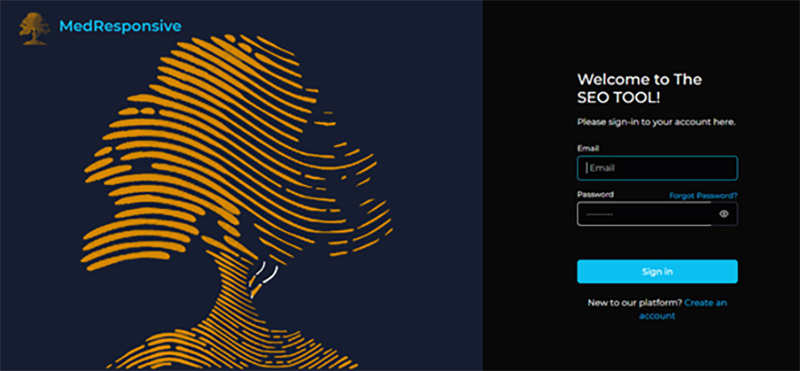In the ever-evolving world of online marketing, staying ahead of the competition requires a strategic approach, especially when it comes to online visibility. MedResponsive, a leader in digital marketing, has introduced an innovative and powerful SEO tool that is set to reshape the way business organizations optimize their online presence. People often turn to search engines like Google to find the right services and products they are looking for. To be visible, websites must rank high in search engine results.
Features of MedResponsive’s New SEO Tool
This free SEO tool is a game-changer for business professionals seeking to boost their online visibility and connect with more leads. This completely free tool allows users to create an account to store their scans and sitemaps, and generate a full sitemap.
Stored Scans Are Broken Down into Different Sections
With this tool, the scans will be broken down into different sections –
Scan Summary – Summary includes the total number of internal and external URLs, the URLs blocked by robots.txt, non-indexable URLs, and URL content types like HTML, JS, CSS, and images, which provide insights into website structure, accessibility, and technical aspects to optimize for improved search performance and user experience.
Internal Audit – The Internal audit encompasses various elements like HTML, CSS, JS, images, PDFs, and other resources that reside within your website. Optimizing these for accessibility, speed, and relevance contributes to better user experience and search engine rankings.
External Audit – The External audit refers to elements sourced from other domains, such as HTML, CSS, JS, images, PDFs, and other resources; managing these external resources efficiently ensures faster loading times and better user experience, contributing to improved search engine visibility.
Security – HTTP and HTTPS play crucial roles in SEO. HTTP stands for Hypertext Transfer Protocol, which is the standard protocol used to transfer data between a user’s browser and a website’s server. For security reasons, HTTPS (Hypertext Transfer Protocol Secure) has become the preferred option. HTTPS uses encryption to secure the data exchanged between the user and the server, ensuring privacy and data integrity.
Response Codes – Response codes play a vital role in SEO. A “200 OK” signifies successful content delivery, ideal for SEO. “301 Moved Permanently” is crucial for proper URL redirection, while “404 Not Found” and “410 Gone” can harm SEO due to missing content. Server errors like “500 Internal Server Error” and “503 Service Unavailable” can disrupt crawling and impact user experience, affecting SEO negatively.
Page Titles – Missing, duplicate, over 60 characters, under 30 characters, matching H1, or multiple page titles can affect SEO; creating unique, concise titles within the appropriate character range and reflecting content enhances search visibility and user experience.
Meta Description – Missing, duplicate, over 155 characters, or under 70 characters meta descriptions can impact SEO; creating unique, concise, and engaging descriptions within the recommended limit enhances search visibility and user engagement.
H1 – Missing, duplicate, or excessively long H1 tags can hinder SEO; ensure each page has a unique H1 tag under 70 characters, conveying its topic clearly to both users and search engines.
Content – Duplicate content poses SEO issues due to content repetition across pages, potentially affecting search rankings; low-quality content lacks value and relevance, diminishing user experience and search performance.
Images – Images larger than 100KB can slow down page loading, impacting user experience and SEO; missing alt text or alt text exceeding 100 characters can hinder accessibility and keyword optimization for search engines.
Canonicals –
- Canonical URL: The preferred web page version to prevent duplicates.
- Missing Page (404): Non-existent page; customize Canonicals 404 page and fix links.
- Multiple Versions: Avoid duplicate content by designating primary URL.
- Self-Refreshing: Use sparingly to prevent SEO and UX issues.
Links – Pages with no internal links limit SEO distribution, while total backlinks from credible sources enhance site authority. Addressing orphan pages by adding internal links improves their visibility and impact.
Structured Data – Structured data through Schema markup improves search results by adding details such as reviews, while missing or inaccurately implemented data can result in missed visibility opportunities and validation errors or warnings that affect content presentation in search results.
This tool comes with a user-friendly interface that makes it accessible to business professionals without extensive SEO expertise. MedResponsive’s team of SEO experts is also readily available to provide guidance, answer questions, and offer support in implementing SEO strategies. Our tool is tailored to cater to websites across all industry sectors, guaranteeing that you can effectively tackle the unique SEO challenges specific to your industry.
Boost your website’s visibility now!
Check out how our SEO tool can help!





